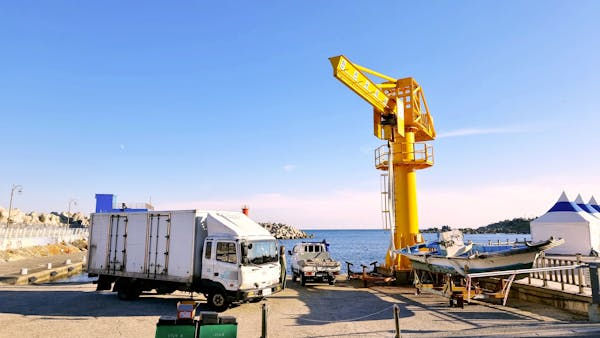What to Check Before Hiring a Crane Truck
- Emma Smith
- Aug 7, 2025
- 3 min read
Updated: Nov 4, 2025

Industrial operations. Choosing the wrong crane or rental company can lead to delays, safety hazards, and increased costs. To ensure a smooth and efficient process, there are several key factors you must consider before finalizing your crane truck hire.
Determine the Right Type of Crane for Your Project
Not all crane trucks are the same. Different types of cranes serve different purposes, and selecting the right one depends on your project’s requirements. Some common types of crane trucks include:
Mobile Cranes – Versatile and easy to transport, ideal for short-term projects.
Truck-Mounted Cranes – Mounted on a truck for mobility, suitable for urban construction.
All-Terrain Cranes – Designed for rough terrain and off-road projects.
Telescopic Cranes – Feature extendable booms for high-reach tasks.
Loader Cranes – Used for loading and unloading heavy materials.
Assess your project’s load capacity, height requirements, and site conditions to choose the most suitable crane.
Check the Crane’s Load Capacity and Reach
One of the most critical factors in crane hire is ensuring the machine can handle the weight and dimensions of your load. Overloading a crane can lead to accidents, equipment damage, and legal liabilities. Before hiring, confirm:
The maximum load capacity of the crane.
The boom length and reach required for your project.
Any restrictions related to lifting near power lines or unstable ground.
Consult with the rental company to ensure the crane’s specifications match your project’s demands.
Verify the Rental Company’s Reputation and Experience
Not all crane hire companies offer the same level of service. A reputable provider will have:
Proper licensing and certifications (OSHA compliance, crane operator certifications).
Positive customer reviews and testimonials.
A well-maintained fleet of modern, reliable cranes.
Insurance coverage for equipment and liability.
Research the company online, ask for references, and check their track record in the industry.
Inspect the Crane’s Condition and Maintenance Records
A poorly maintained crane can malfunction, leading to costly downtime or accidents. Before finalizing the hire, request:
Recent inspection reports to ensure compliance with safety standards.
Maintenance logs to confirm regular servicing.
A physical inspection (if possible) to check for wear and tear, hydraulic leaks, or structural damage.
Avoid companies that cannot provide proper documentation or seem hesitant about inspections.
Confirm Operator Qualifications and Experience
Even the best crane is only as good as its operator. Ensure that the crane comes with a licensed and experienced operator who has:
Relevant certifications (such as NCCCO in the U.S. or CPCS in the UK).
Experience with the specific type of crane you are hiring.
Knowledge of safety protocols and emergency procedures.
If you plan to use your own operator, verify that they meet all legal and training requirements.
Understand the Rental Agreement and Costs
Crane hire costs can vary significantly based on factors like:
Duration of hire (daily, weekly, or monthly rates).
Additional fees (transport, fuel, operator costs, overtime charges).
Insurance and liability coverage.
Read the contract carefully to avoid hidden costs. Ask about:
Cancellation policies in case of project delays.
Breakdown and repair responsibilities.
Payment terms and deposits.
A transparent rental agreement helps prevent disputes later.
Assess Site Accessibility and Ground Conditions
Before the crane arrives, evaluate the job site to ensure smooth operations:
Ground stability – Soft or uneven terrain may require stabilizing outriggers or mats.
Overhead obstructions – Check for power lines, trees, or buildings that could interfere with lifting.
Space for setup – Ensure there’s enough room for the crane and its movements.
If the site has limitations, discuss possible solutions with the rental company, such as using a smaller crane or adjusting the work plan.
Review Safety Measures and Emergency Protocols
Crane operations involve significant risks, so safety must be a top priority. Confirm that:
The rental company follows OSHA or local safety regulations.
The crane has safety features like load moment indicators, anti-two-block systems, and emergency stop functions.
There’s a clear emergency response plan in case of accidents.
Conduct a pre-lift meeting with the operator and site team to review safety procedures.
Check Availability and Scheduling
Crane trucks are often in high demand, especially during peak construction seasons. To avoid delays:
Book in advance to secure the crane when needed.
Confirm delivery and pickup times to align with your project timeline.
Have a backup plan in case of unexpected unavailability.
Get Everything in Writing
Finally, ensure all agreements—including crane specifications, costs, operator details, and safety protocols—are documented in writing. This protects both parties and provides clarity in case of disputes.
Final Thoughts
Hiring a crane truck is a major decision that impacts the efficiency, safety, and success of your project. By carefully evaluating the crane type, rental company reputation, operator qualifications, and site conditions, you can avoid costly mistakes and ensure a smooth operation. Always prioritize safety, transparency, and proper planning to make the most of your crane hire experience.





Comments